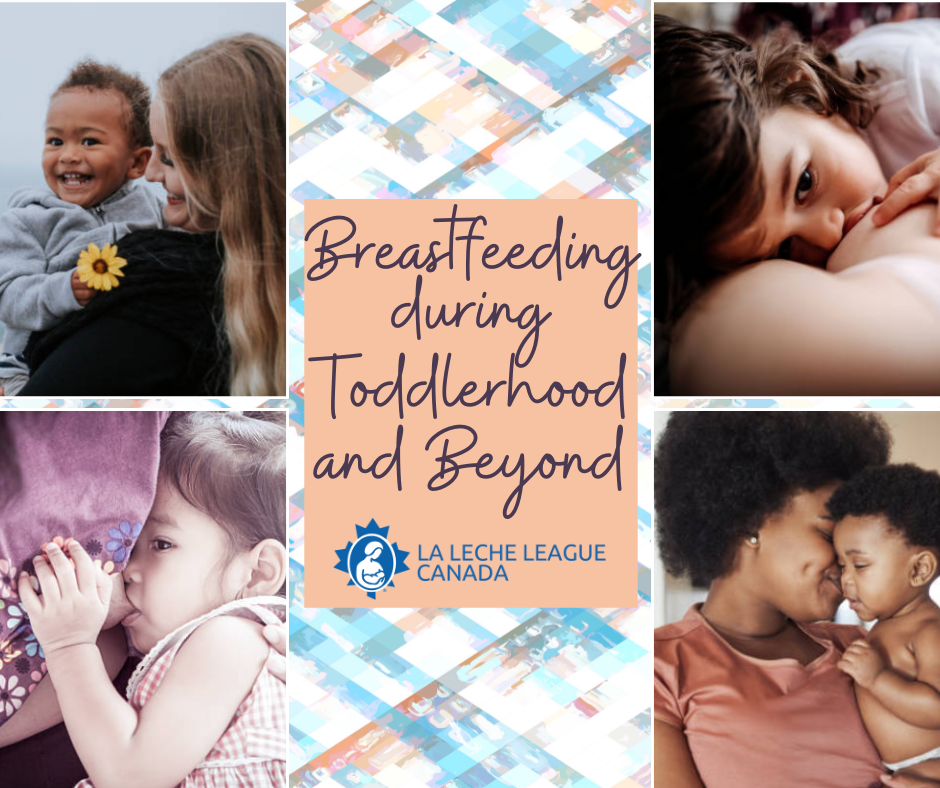
It is your decision to nurse as long as you and your baby choose. Many mothers do not set out to breastfeed beyond a year or so. As your baby moves beyond toddlerhood you may find that breastfeeding continues to be important to both you and your child. It can be helpful to know that Health Canada recommends breastfeeding up to two years or longer after introducing solids. La Leche League philosophy states, “Ideally the breastfeeding relationship will continue until the child outgrows the need”.
As your nursing child gets older, you may find that you need extra support. Nursing into toddlerhood may be longer than your friends and family expected. La Leche League Canada is a great place to find information and support for nursing little ones of any age.
Nutritional value
Your human milk continues to be a highly-nutritious, easily-digested food even as toddlers or young children add other foods to their diets. There is no age at which your milk loses its nutritional or disease-fighting value. As your baby grows, your milk changes to meet your baby's needs. The antibodies in human milk actually increase after the baby is 12 months old. This provides added protection for toddlers who have more opportunities to pick up germs. Your milk contains antibodies and other immune factors that help protect your child against infections and disease. This protection can last a lifetime.
Emotional benefits
Many toddlers and preschoolers nurse primarily for comfort and to “touch base” rather than for food. However, human milk can still contribute significant nutrition and calories to the toddler’s diet. Also, many mothers find that a short nursing session will defuse a tantrum, cure a “boo-boo” or soothe hurt feelings. Breastfeeding is an important mothering tool that can work magic in stressful situations. Nursing is a valuable way to support your child’s social and emotional development. According to lactation specialist and pediatrician Dr. Jack Newman, “The child who breastfeeds until he weans himself (usually from 2 to 4 years), is usually more independent, and, perhaps, more importantly, more secure in his independence. He has received comfort and security from the breast, until he is ready to make the step himself to stop. And when a child makes that step himself, he knows he has achieved something, he knows he has moved ahead. It is a milestone in his life of which he is proud.”
Communicating with others
You may find that your family and friends question your decision to nurse into toddlerhood. Remember that you do not owe anyone an explanation for your choice. It can be helpful to point out gently to others that you have made this decision because you feel it is best for your family and your child. Everyone weans eventually. And when it is the right time for you and your child, your breastfeeding journey will come to an end. Until then, you will continue to do what works for you and your child.
You are not alone
You may find that you sometimes have conflicting feelings about breastfeeding into toddlerhood. Some days are challenging. Other days you wonder how you’d parent your toddler without breastfeeding. It can be helpful to remember why you made the choice to continue to nurse past a year. You may find that some of your closest friends and family members are not helpful when challenges occur. It can be empowering to talk to others who have made the same choice. A La Leche League meeting is a great place to meet other nursing parents. You are not alone. Thousands of mothers right now have made the choice to nurse beyond infancy and even toddlerhood. And for thousands of years children have been breastfed beyond infancy. Anthropologists believe weaning between 2.5 - 7 years is the biological norm for humans.
If you need support or information about nursing your toddler, please contact your local La Leche League Canada Leader.
References
Breastfeeding Your Baby. Health Canada (November, 9, 2022).
WHO
Jack Newman Breastfeed a Toddler – Why on Earth? Dr Jack Newman, International Breastfeeding Centre, Toronto, Ontario
Updated 2024
